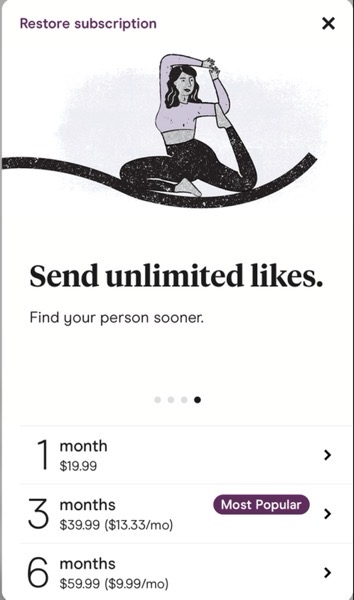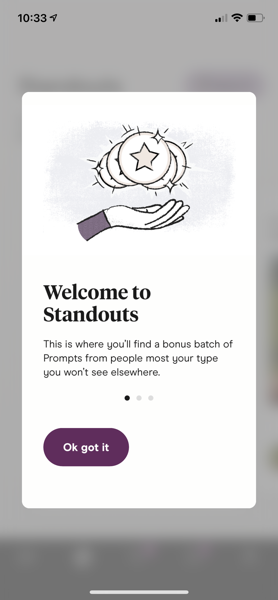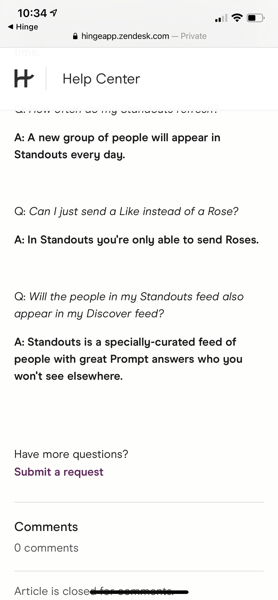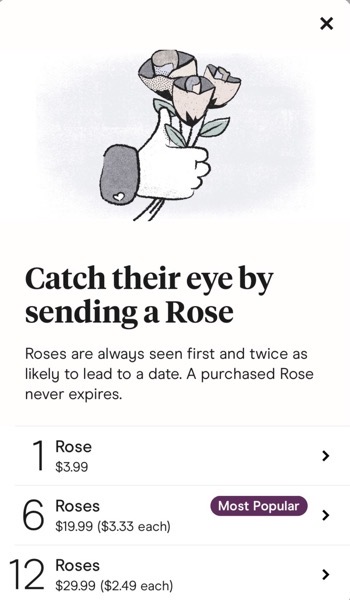Hinge’s new Standout feature pushes them further into a crappy microtransaction business model and also manages to turn their best users as bait, and if you’re a user like me, you should be looking for a way out.
I understand why they’re looking for new ways to make money. First, they’re a part of the Match.com empire, and if they don’t show up with a bag of money that contains 20% more money every year, heads roll.
Second, though, every dating app struggles to find a profit model that’s aligned with their users. If you’re there to find a match and stop using the app, the ideal model would be “you only pay when you find your match and delete the app†but no one’s figured out how to make that work.
(Tinder-as-a-hookup-enabler aligns reasonably well with a subscription model: “we’ll help you scratch that regular itch you haveâ€)
Generally, monetization comes in two forms:
- ads, to show free users while they’re browsing, and selling your data
-
functionality to make the whole experience less terrible
Which, again, presents a dating business with mixed incentives. Every feature that makes the experience less painful offers an incentive to make not paying even more painful.
For example: if you’re a guy, you know it’s going to be hard to stand out given how many other men are competing for a potential match’s attention. So sites offer you a way to have your match shown ahead of users not spending money. If a customer notices that their “likes†are getting way more responses when they pay for that extra thing, they’re going to be more likely to buy them… so why not make the normal experience even more harrowing?
Dating apps increasingly borrow from free-to-play games — for instance, setting time limits on activities. You can only like so many people… unless you payyyyy. Hinge’s “Preferred†is in on that:

They also love to introduce different currencies, which they charge money for. Partly because they can sell you 500 of their currency in a block and then charge in different increments, so you always need more or have some left over that will nag at you to spend, which requires more real money. Mostly because once it’s in that other currency, they know that we stop thinking about it in real money terms, which encourages spending it.
One of the scummiest things is to reach back into the lizard brain to exploit people’s fear of loss. Locked loot boxes are possibly the most famous example: you give them a chest that holds random prizes, and if they don’t pay for the key, they lose the chest. It’s such a shitty thing to do that Valve, having made seemingly infinite money from it, gave up the practice.
Hinge likes the sound of all this. Introducing:

Wait, won’t see elsewhere? Yup.

This is a huge shift.
Hinge goes from “we’re going to work to present you with the best matches with paid features make that experience better” to “we’re taking the best away and into new place, and you need this new currency to act on them or you’ll lose them.”
If you believed before that you could use the app’s central feature to find the best match, well, now there’s doubt. They’re taking people out of that feed. You’ll never see them again! That person with the prompt that makes you laugh will never show up in your normal feed! And maybe they’ll never show up on Discover!
Keep in mind too that even from their description, they’re picking out people and their extremely successful prompts. They’ve used data to find the most-successful bait, and they’re about to charge you to bite.

$4. Four bucks! Let’s just pause and think about how outrageous this is. Figure 90% of conversations don’t get to a first date — that’s $36 per first date this gets you. And what percentage of first dates are successful? What would you end up paying to — as Hinge claims to want to do — delete the app because you’ve found your match?
Or, think about it the other way: if Hinge said “$500, all our features, use us until you find a match†that would be a better value. But they don’t because no one would buy that, and likely they’ve run the math and think that people are more likely to buy that $20 pack, use the roses, recharge, and they’ve got a steady income, or the purchaser will give up after getting frustrated, and that person wasn’t going to spend $500. More money overall from more people spending.
If you’re featured on this — and they don’t tell you if you are — you’re the bait to get people to spend on micro transactions. This just… imagine you’ve written a good joke or a nice thing about yourself, and people dig it.
Now you’re not going to appear normally to potential matches. Now people have to pay $4 for a chance to talk to you.
Do you, as the person whose prompt generated that rose, receive one to use yourself?
You do not.
Do you have the option to not be paraded about in this way?
You do not.
This rankles me, as a user, and also professionally. As a good Product Manager, I want to figure out how to help your customers achieve their goals. You try to set goals and objectives around this — “help people’s small businesses thrive by reducing the time they spend managing their money and making it less stressful†and then try to find ways you can offer something that delivers.
Sometimes this results in some uncomfortable compromises. Like price differentiation — offering some features that are used by big businesses with big budgets at a much higher price, while you offer a cheaper, limited version for, say, students. The big business is happy to pay to get the value you’re offering them, but they’d certainly like to pay the student price.
Or subscription models generally — I want to read The Washington Post, and I would love not to pay for it.
This, though… this is gross. It’s actively hostile to the user, and you want to at least feel the people you’re trusting to help find you a partner are on your side.
I can only imagine that if this goes well — as measured by profit growth, clearly — there’s a whole roadmap of future changes to make it ever-more-expensive to look for people, and to be seen by others, and it’ll be done in similarly exploitative, gross ways.
I don’t want to be on Hinge any more.
Oh my god, I love this. And I think Hinge should be paying us if we help them sell these features.
1000% i agree!! this feature is outrageous!!! as users, we’ve got to flood hinge’s reviews/contact email threatening to delete our profiles if hinge doesn’t revert to the old, better model
Hello! I came across this post while trying to get to the bottom of this standouts feature. I completely agree with everything you’ve written, and I’m pretty sure I’m being used as “bait†and locked behind a paywall.
Is there a way we could all get together and start a movement to leave Hinge? Like, what if we started a social campaign to encourage a mass exodus, and get as many Hinge users as possible to migrate to a different app? I’ve been really baffled lately at how poorly designed these things are.
Anyway, I appreciate your post! email me if you want to brainstorm.
True this! What’s even the point anymore..? So annoying..
I noticed Hinge did this a few months ago. And while they claim the “standouts†refer to the persons comments, in reality they are extracting the most attractive people and making you pay more to contact them. As you said this likely has a negative impact on those placed in the standout area. Not sure I’m in the standout section but I received one rose and since then my “likes†disappeared after being fairly active before this. Of course you won’t know any of this when signing up because you are assuming wrongly that you could contact anyone with a standard membership. You can’t. A new low indeed.
Absolutely. So frustrating to enter the world of possibility on the app and be thwarted in this way and have no way around it. Paying out of exasperation is not a good way to pay.